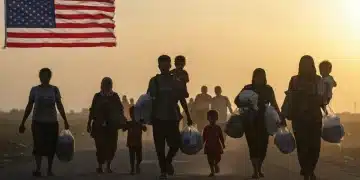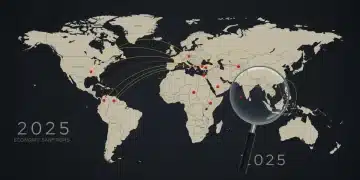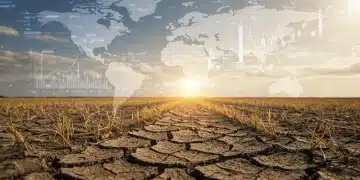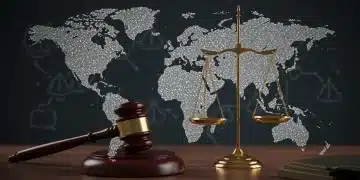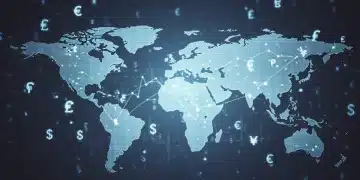Human Rights Watch 2025: Tracking 12 Critical Violations & US Aid
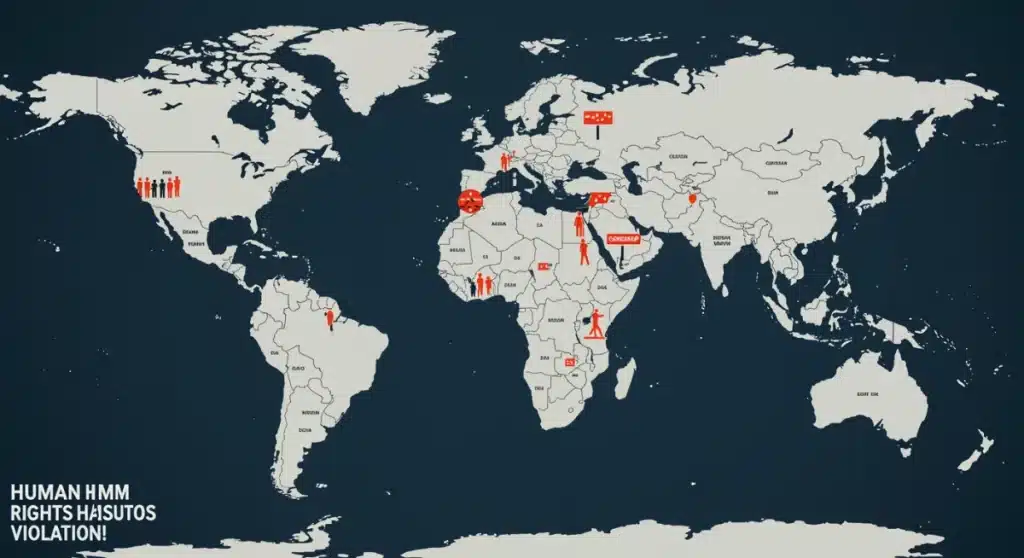
Human Rights Watch 2025 details 12 critical global violations, profoundly impacting US foreign aid policy and requiring urgent, practical solutions. This report provides key updates and analysis on these pressing human rights challenges.
The latest report from Human Rights Watch for 2025 presents a sobering assessment, highlighting
Human Rights Watch 2025: Tracking 12 Critical Violations Globally and Their Implications for US Foreign Aid (RECENT UPDATES, PRACTICAL SOLUTIONS)
as a central focus for international policy. This comprehensive overview delves into the most pressing human rights issues worldwide, examining their profound impact and scrutinizing how the United States can adapt its foreign aid strategies to promote accountability and foster change. This report prioritizes what’s new, why it matters, and what to watch next.
Understanding the 12 Critical Violations in 2025
Human Rights Watch (HRW) has identified 12 critical violations that demand immediate global attention in 2025. These issues span across continents, reflecting a complex web of political instability, economic disparities, and systemic abuses. The report emphasizes that these are not isolated incidents but rather interconnected challenges that undermine international peace and security.
These violations range from entrenched armed conflicts and state-sponsored repression to the erosion of democratic freedoms and widespread discrimination. HRW’s detailed analysis provides crucial context, explaining how these abuses have evolved over the past year and projecting their potential trajectory. Understanding these violations is the first step toward developing effective responses and ensuring that human rights remain at the forefront of international diplomacy.
Key Thematic Areas of Concern
- Conflict-Related Abuses: Documenting atrocities in ongoing conflicts, including targeting civilians, sexual violence, and the use of prohibited weapons.
- Suppression of Dissent: Highlighting countries where freedom of expression, assembly, and association are severely curtailed, leading to arbitrary arrests and politically motivated trials.
- Discrimination and Inequality: Addressing systemic discrimination based on race, ethnicity, religion, gender, sexual orientation, and disability, as well as the plight of marginalized communities.
- Environmental Degradation and Rights: Examining how environmental destruction and climate change disproportionately affect vulnerable populations and infringe upon their rights to health and livelihood.
The report underscores that these thematic areas often overlap, creating compounding crises that exacerbate human suffering. HRW’s methodology involves extensive on-the-ground research, interviews with victims and witnesses, and rigorous verification of facts, ensuring the reliability and credibility of their findings. This meticulous approach is vital for holding perpetrators accountable and informing policy decisions.
In essence, the 2025 report serves as a critical barometer for the state of human rights worldwide. It provides a stark reminder of the ongoing struggles faced by millions and calls for a renewed commitment from international actors to uphold universal human rights principles. The implications for global stability and the moral standing of nations are profound, necessitating a concerted and coordinated response.
Implications for US Foreign Aid Policy
The findings of the Human Rights Watch 2025 report carry significant weight for US foreign aid policy. The United States, as a leading provider of humanitarian and development assistance, often ties its aid to human rights conditions. However, the effectiveness and ethical implications of this approach are continuously debated, especially when violations persist despite aid allocations.
The report challenges policymakers to reassess current strategies, urging for a more nuanced and impactful integration of human rights considerations into aid programs. This includes not only withholding aid from regimes engaged in gross violations but also exploring innovative ways to support civil society, promote democratic governance, and protect vulnerable populations directly, even in repressive environments.
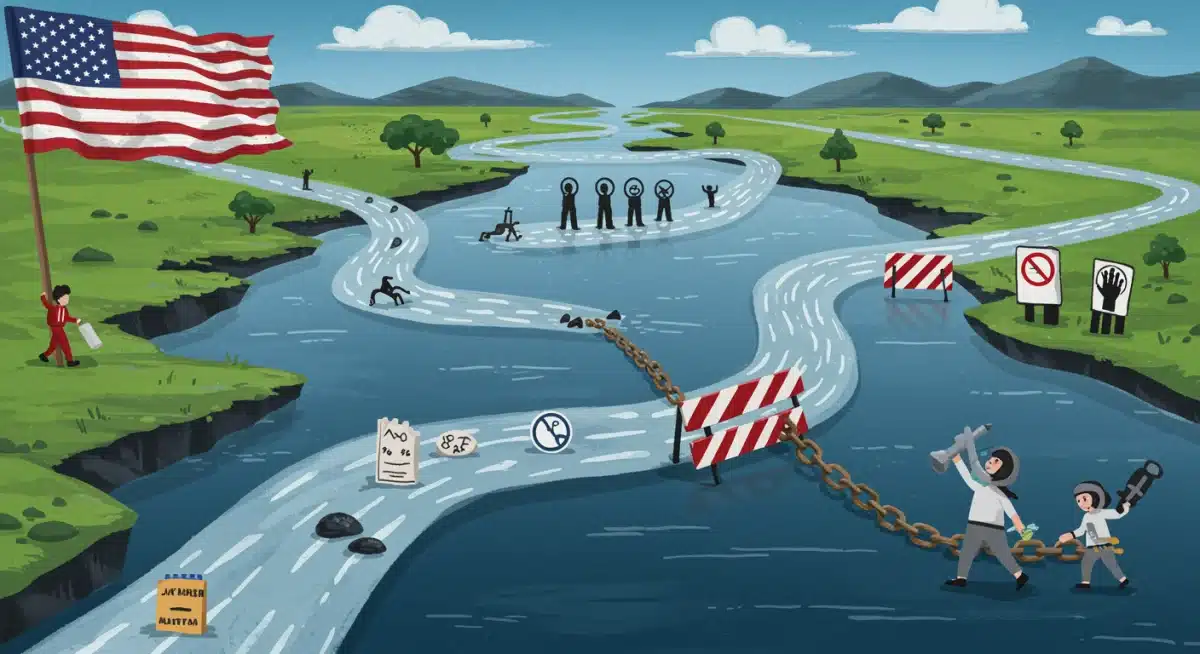
Rethinking Conditionality and Engagement
Historically, conditionality—linking aid to human rights improvements—has been a cornerstone of US foreign policy. However, HRW’s 2025 analysis suggests that this approach sometimes falls short, occasionally harming the very populations it aims to protect or failing to incentivize genuine change from recalcitrant governments. The report advocates for a more flexible and strategic application of conditionality, coupled with robust engagement.
This means distinguishing between aid that directly benefits oppressive regimes and aid that supports essential services or independent organizations working on the ground. A key recommendation is to bolster support for local human rights defenders and independent media, empowering them to document abuses and advocate for change from within. Such direct support can bypass corrupt governmental structures and ensure resources reach those most in need.
- Targeted Sanctions: Implementing precise sanctions against individuals and entities responsible for violations, rather than broad measures that may harm innocent citizens.
- Diplomatic Pressure: Utilizing diplomatic channels and multilateral forums to publicly condemn abuses and apply consistent pressure on offending states.
- Capacity Building: Investing in programs that strengthen judicial systems, independent oversight bodies, and civil society organizations in recipient countries.
The report also stresses the importance of consistency in US foreign aid policy. Inconsistent application of human rights standards can undermine credibility and send mixed signals to both perpetrators and victims. Therefore, a clear, unified approach across all aid initiatives is essential. The US must demonstrate unwavering commitment to its stated values, even when faced with geopolitical complexities or competing interests.
Ultimately, the implications for US foreign aid are about maximizing impact and ensuring that aid does not inadvertently sustain or enable human rights violations. It’s a call to refine existing tools and develop new ones that are more responsive to the evolving landscape of global abuses, turning aid into a genuine force for positive change.
Recent Updates and Emerging Challenges
The human rights landscape is dynamic, and the HRW 2025 report includes crucial recent updates that highlight emerging challenges. These updates often reflect shifts in geopolitical power, technological advancements, and new forms of state control or non-state actor abuses. Staying abreast of these developments is vital for crafting timely and effective interventions.
One significant update concerns the rise of digital authoritarianism, where governments increasingly use surveillance technologies, internet shutdowns, and online censorship to suppress dissent and control information. This poses a new frontier for human rights advocacy, as traditional methods of monitoring and reporting are challenged by sophisticated digital repression tactics.
Technological Repression and Its Impact
The report details how states are leveraging artificial intelligence, facial recognition, and other advanced technologies to monitor citizens, track activists, and silence critical voices. These tools enable a level of control previously unimaginable, making it harder for individuals to organize, communicate freely, and expose abuses without fear of reprisal. This digital crackdown often operates under the guise of national security, but its primary effect is the erosion of fundamental freedoms.
- Surveillance Technologies: The proliferation of state-sponsored spyware and surveillance programs targeting journalists, opposition figures, and human rights defenders.
- Internet Censorship: The increasing frequency of internet blackouts and content filtering, particularly during protests or periods of political unrest.
- AI-Powered Discrimination: The potential for biased algorithms to perpetuate or exacerbate discrimination in areas like law enforcement, employment, and social services.
Another emerging challenge highlighted in the report is the weaponization of humanitarian aid. In conflict zones, aid is sometimes deliberately obstructed, diverted, or used as a political tool, leading to severe humanitarian crises and exacerbating the suffering of civilians. This manipulation undermines the fundamental principles of humanitarianism and demands robust international oversight and accountability mechanisms.
These recent updates and emerging challenges underscore the need for constant vigilance and adaptability in human rights advocacy. The methods of repression are evolving, and so too must the strategies for protection and accountability. The HRW 2025 report serves as an urgent call to action, demanding that the international community recognize and respond to these new threats effectively.
Practical Solutions for Addressing Violations
Beyond identifying problems, the Human Rights Watch 2025 report offers a suite of practical solutions aimed at addressing the 12 critical violations. These solutions are multi-faceted, requiring a combination of diplomatic pressure, legal mechanisms, economic incentives, and robust civil society engagement. The emphasis is on actionable strategies that can yield tangible improvements on the ground.
One core component of these solutions involves strengthening international legal frameworks and ensuring their enforcement. This includes supporting the International Criminal Court (ICC) and other international justice mechanisms, as well as promoting universal jurisdiction for grave crimes. Bringing perpetrators to justice sends a powerful message that impunity will not be tolerated.
Empowering Local Actors and Civil Society
A recurring theme in HRW’s proposed solutions is the empowerment of local human rights defenders and civil society organizations. These groups are often the first responders to abuses and possess invaluable on-the-ground knowledge. Providing them with financial, technical, and political support can significantly enhance their capacity to monitor, report, and advocate for change in their communities.
Moreover, fostering an environment where civil society can operate freely without fear of reprisal is paramount. This involves advocating for legislative reforms that protect civic space, challenging restrictive laws, and providing emergency support for activists at risk. The resilience of local actors is a critical asset in the global fight for human rights.
- Support for Independent Media: Funding and protecting independent journalists and media outlets that expose abuses and hold power accountable.
- Education and Awareness: Investing in human rights education programs to foster a culture of respect for rights from an early age and empower individuals to demand their entitlements.
- Corporate Accountability: Holding corporations accountable for human rights abuses in their supply chains and operations, particularly in sectors with high risks of exploitation.
Another practical solution involves innovative diplomacy and multilateral cooperation. This means building broad coalitions of states committed to human rights, leveraging the power of international organizations, and engaging with non-traditional actors such as tech companies and religious leaders. Collaborative efforts can create a stronger, more unified front against abuses.
The report also stresses the importance of data and evidence-based advocacy. By meticulously documenting violations and presenting compelling evidence, human rights organizations can influence public opinion, pressure governments, and inform legal proceedings. Transparency and access to information are therefore crucial tools in the pursuit of justice.
The Role of International Cooperation and Alliances
Addressing the 12 critical violations highlighted in Human Rights Watch 2025 cannot be done in isolation. International cooperation and the formation of strategic alliances are indispensable. Global challenges like mass displacement, climate-induced migration, and transnational repression require coordinated responses that transcend national borders and political ideologies.
The report emphasizes the need for multilateral institutions, such as the United Nations, to play a more robust role in monitoring, reporting, and responding to human rights crises. Strengthening the mandates and resources of UN human rights bodies and ensuring their independence are critical steps toward enhancing global accountability.
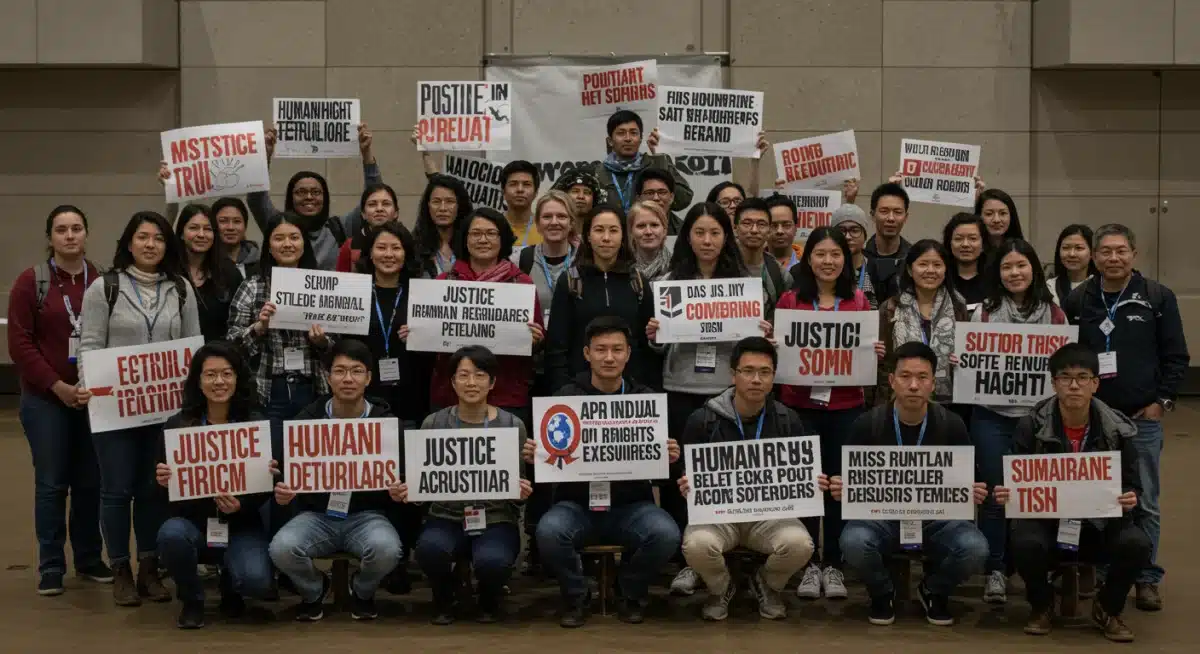
Strengthening Multilateral Frameworks
Effective international cooperation relies on a shared commitment to universal human rights standards. The HRW report calls on states to reaffirm their obligations under international human rights treaties and to ensure their domestic laws align with these commitments. This includes ratifying outstanding treaties and withdrawing reservations that undermine their intent.
Furthermore, regional organizations can play a vital complementary role. Bodies like the African Union, the Organization of American States, and the European Union have unique capacities to address human rights issues within their respective regions. Supporting these regional mechanisms and fostering collaboration between them can create a powerful network for human rights protection.
- Joint Diplomatic Initiatives: Coordinating diplomatic efforts among like-minded states to collectively pressure countries engaged in severe human rights abuses.
- Information Sharing: Establishing mechanisms for intelligence and information sharing on human rights violations to facilitate early warning and rapid response.
- Cross-Border Advocacy: Supporting and facilitating cross-border collaborations among human rights organizations to address transnational issues effectively.
The report also highlights the importance of alliances between governments and civil society. When policymakers work hand-in-hand with human rights organizations, the impact of interventions is significantly amplified. Civil society provides critical information, expertise, and a moral compass, while governments possess the diplomatic and economic leverage to effect change.
Building these alliances requires trust, transparency, and a willingness to engage in difficult conversations. It means recognizing that human rights are not merely an internal matter but a shared global responsibility. The collective strength of international cooperation is the most potent weapon against the forces of repression and injustice.
Monitoring and Accountability Mechanisms
A crucial aspect of addressing human rights violations is the establishment and maintenance of robust monitoring and accountability mechanisms. The Human Rights Watch 2025 report underscores that without effective systems to track abuses and hold perpetrators responsible, even the most well-intentioned policies will fall short. Accountability is the cornerstone of preventing future violations.
The report advocates for strengthening existing international and national human rights institutions. This includes ensuring the independence and adequate resourcing of national human rights commissions, ombudsman offices, and judicial bodies. These domestic mechanisms are often the first line of defense for victims of abuse.
Enhancing Documentation and Reporting
Accurate and timely documentation of human rights violations is fundamental to accountability. HRW’s report emphasizes the importance of investing in forensic documentation, satellite imagery analysis, and open-source intelligence to gather irrefutable evidence of abuses. These tools are crucial for building strong legal cases and countering disinformation campaigns.
Furthermore, reporting mechanisms must be accessible and safe for victims and witnesses. This means protecting whistleblowers, providing secure channels for reporting, and ensuring that those who come forward are not subjected to retaliation. Confidentiality and victim support are paramount in encouraging reporting and ensuring justice.
- Independent Investigations: Supporting independent international investigations into grave human rights violations, such as those conducted by UN commissions of inquiry.
- Truth and Reconciliation Commissions: Advocating for and assisting in the establishment of truth and reconciliation processes in post-conflict or transitional justice settings.
- Sanctions Regimes: Utilizing targeted sanctions, such as the Magnitsky Act, to hold individual perpetrators accountable for human rights abuses by freezing assets and imposing travel bans.
The report also highlights the role of technology in enhancing monitoring and accountability. Secure digital platforms can facilitate safer reporting, while blockchain technology could potentially be used to create immutable records of violations. These innovations offer new avenues for transparency and evidence collection, making it harder for perpetrators to evade justice.
Ultimately, monitoring and accountability mechanisms are about creating a system where human rights violations have consequences. They serve as a deterrent, provide avenues for redress for victims, and reinforce the international norm that human rights are universal and non-negotiable. The HRW 2025 report calls for renewed global commitment to strengthening these vital safeguards.
Future Outlook and Recommendations for Policy Makers
Looking ahead, the Human Rights Watch 2025 report provides a forward-looking perspective on the trajectory of human rights and offers concrete recommendations for policymakers. The challenges are formidable, but the report maintains that with concerted effort and strategic interventions, progress is achievable. The future of human rights depends on proactive and principled leadership.
One key recommendation is for governments, particularly the US, to adopt a human rights-centered approach across all aspects of foreign policy. This means integrating human rights considerations not just into aid, but also into trade agreements, security partnerships, and climate change initiatives. A holistic approach ensures that human rights are not an afterthought but a foundational principle.
Prioritizing Prevention and Early Warning
The report stresses the importance of shifting from reactive responses to proactive prevention. This involves investing in early warning systems that can identify potential human rights crises before they escalate. Such systems would integrate data from various sources, including civil society reports, media analysis, and diplomatic intelligence, to flag emerging threats.
Prevention also means addressing the root causes of violations, such as poverty, inequality, and political exclusion. Development aid, when strategically deployed, can play a crucial role in building resilient societies where human rights are more likely to thrive. This long-term investment is often more effective and less costly than responding to full-blown crises.
- Reviewing Aid Effectiveness: Conducting regular, independent reviews of foreign aid programs to ensure they are meeting human rights objectives and adapting strategies as needed.
- Engaging with Non-State Actors: Developing strategies to engage effectively with powerful non-state actors, including corporations and armed groups, to promote human rights compliance.
- Public Advocacy: Utilizing public diplomacy and global communication campaigns to raise awareness about human rights issues and mobilize public support for action.
Another critical recommendation is to foster greater public engagement and awareness. Informed citizens are more likely to demand accountability from their governments and support policies that prioritize human rights. Education, media literacy, and accessible information are therefore vital tools in shaping public discourse and building a global constituency for human rights.
In conclusion, the HRW 2025 report is not just a catalogue of abuses but a blueprint for action. It calls on policymakers to be courageous, innovative, and consistent in their commitment to human rights. The future outlook, while challenging, offers opportunities for meaningful change if the international community is willing to seize them with determination and collaboration.
Key Finding |
Brief Description |
|---|---|
12 Critical Violations |
HRW identifies top global abuses, from conflict to digital repression, demanding urgent action. |
US Aid Implications |
Report urges strategic reassessment of US foreign aid, focusing on human rights integration and civil society support. |
Emerging Challenges |
Rise of digital authoritarianism and weaponization of aid present new fronts for human rights defense. |
Practical Solutions |
Emphasis on strengthening legal frameworks, empowering local actors, and fostering international cooperation. |
Frequently Asked Questions About Human Rights Watch 2025
The 12 critical violations cover a spectrum of abuses including conflict-related atrocities, suppression of dissent, systemic discrimination, and the human rights impact of environmental degradation. These issues are detailed across various regions, underscoring their interconnected global nature and urgent need for intervention.
The report serves as a crucial guide for US policymakers, urging them to reassess foreign aid conditionality and integrate human rights more deeply into aid strategies. It recommends targeted sanctions, diplomatic pressure, and direct support for civil society to ensure aid genuinely promotes human rights objectives.
Emerging challenges include the rise of digital authoritarianism, where governments use advanced surveillance and censorship to control populations, and the weaponization of humanitarian aid in conflict zones. These new threats require innovative responses and a flexible approach to human rights advocacy.
HRW proposes strengthening international legal frameworks, empowering local human rights defenders, promoting corporate accountability, and fostering international cooperation. Solutions also include innovative diplomacy, evidence-based advocacy, and support for independent media to ensure accountability and justice.
International cooperation is vital because global challenges like mass displacement and transnational repression demand coordinated responses. Strengthening multilateral institutions, forming strategic alliances, and engaging with diverse actors create a powerful, unified front against abuses, ensuring consistent application of human rights standards worldwide.
What this means
The Human Rights Watch 2025 report critically reframes the global human rights agenda, providing a clear roadmap for addressing persistent and emerging violations. It underscores that effective responses require a dynamic blend of targeted foreign aid adjustments, robust international cooperation, and unwavering commitment to accountability. Policymakers must now translate these insights into actionable strategies, prioritizing human dignity and justice in an increasingly complex world. The ongoing developments will shape how nations uphold their responsibilities and protect the most vulnerable.

